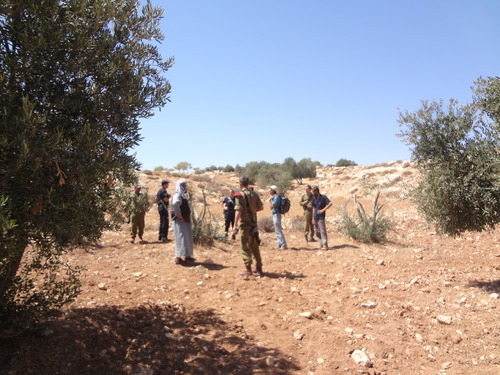One of the recurring themes (and I’ve only been here a week!) is the apparent sincerity with which the Israelis, when actually faced with a Palestinian, hear their problems. Settlement delegations share tea and listen intently while Bedouin families show them around the new school built from tyres, an idea copied from the slums of Latin America. Police take notes with furrowed brow as farmers describe the devastation wrought on their trees by those from the illegal Settlements and illegal Outposts. (While Settlements are legal in Israeli law, the 4th Geneva Convention, art. 49 states that “The Occupying Power shall not deport or transfer parts of its own civilian population into the territory it occupies.”)
Yet within three days of being shown the school, the (illegal) Settlement council had taken out a court order for its demolition, as it was a threat to their security. For years now, the Settlers of Ma’on have been randomly but steadily destroying any viable trees in the olive groves of At Tuwani, squeezing the villagers’ livelihoods and making their existence miserable. It seems to me that if the police had any intention of actually stopping the vandalism, they would either have arrested someone by now, or perhaps have evicted the Settlers- at least from the illegal Outpost.

This is the worst kind of neighbourliness. The photo above shows the intense interest of the authorities: the police woman takes notes while the operator of the farm describes the damage. Standing by are several members of various other authorities: the Civil Administration and the Israeli Defence Force. How can you doubt their intention to maintain the rule of law?
Yet something is wrong. In a strong democracy, would you have nearly the same number of international observers (many out of shot, watching on) as local plaintiffs? And here we come to the words of Cicero: “Freedom is participation in power.” For Palestinians (because they are not Israeli citizens) are forbidden from joining the IDF or the police, they are barred from the judiciary and they may not stand for election. In practice, it is nigh impossible for a Palestinian to be on so much as a local council or a village committee- at least, any such Israeli councils. For these are the only ones with any real power. And anyway there are de facto two sets of laws. Palestinians are tried in military courts for the smallest infringement of a corrupted legal system which seems almost tailor-made to frustrate their every natural impulse. Yet those Israelis living in the illegal Settlements and illegal Outposts- on the rare occasions that they are pursued, caught and tried- are treated to a fair trial before a civil court.
This is a question for citizens, supporters and detractors alike: is this the Israel you want?
I work for the National Council of Churches as an Ecumenical Accompanier serving on the World Council of Churches’ Ecumenical Accompaniment Programme in Palestine and Israel (EAPPI). The views contained herein are personal to me and do not necessarily reflect those of my employer or the WCC. If you would like to publish the information contained here (including posting on a website), or distribute it further, please first contact Debra Porter (eappi@ncca.org.au) or the EAPPI Communications Officer (communications@eappi.org) for permission. Thank you.